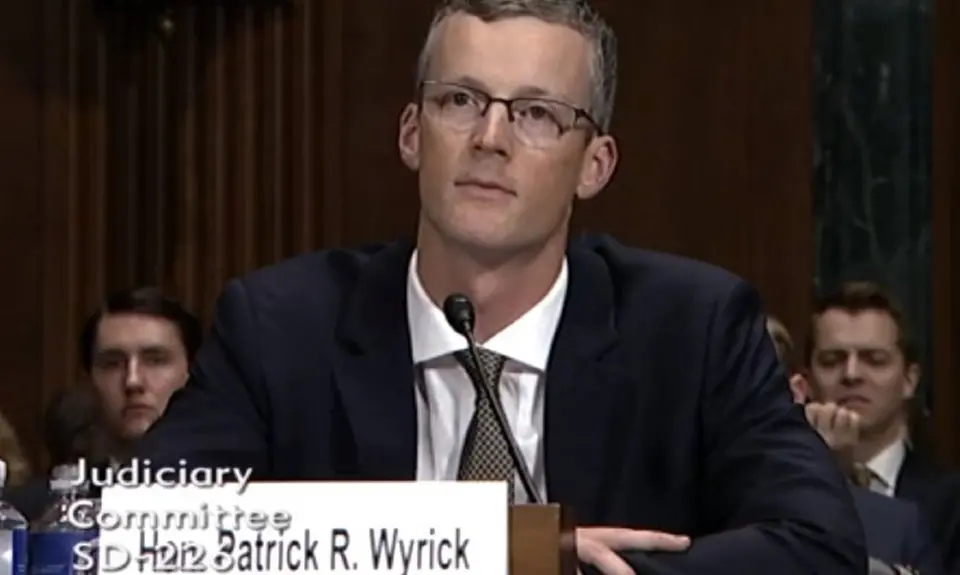PFAW opposed Wyrick's nomination following the publication of this post and his May hearing.
On April 10, President Trump nominated Patrick Wyrick to a seat on the U.S. District Court for the Western District of Oklahoma. The Senate Judiciary Committee held Wyrick’s hearing on May 23. People For the American Way wrote to committee members with deep concerns about the Wyrick nomination. You can download our letter here.
Dear Chairman Grassley, Ranking Member Feinstein, and Committee Members:
On behalf of the hundreds of thousands of members of People For the American Way, we write with deep concerns about the nomination of Patrick Wyrick to be a district court judge in the Western District of Oklahoma. Despite his youth and relatively short time practicing law, he has been added to President Trump’s list of potential Supreme Court nominees.i Therefore, it is critically important for the committee to use this opportunity to question him about his record, his approach to interpreting the law, and his willingness and ability to prevent his personal ideological views from affecting his judicial decisions.
As a threshold matter, Wyrick’s presence on Trump’s Supreme Court list raises concerns about his qualifications, since the president promised to apply a litmus test to any high court nominee: opposition to Roe v. Wade and the constitutional right to abortion.ii Senators should determine what conversations, if any, Wyrick has had about his views on reproductive rights with the president, any member of his administration, or individuals who advise the administration on judicial nominees (such as members of the Federalist Society).
Our nation’s courts exist to protect our legal rights, and they are perhaps never more important than when a majority seeks to curtail a core constitutional right. Those to whom we entrust the solemn responsibility of a lifetime judicial position must recognize that the liberty protected by the Fifth and Fourteenth Amendments is expansive—and that it includes the right of women to make their own reproductive choices.
Senators must also ascertain how Wyrick would approach a variety of other important legal issues. President Trump’s judicial nominees all testify that they will follow precedent but refuse to elaborate in any meaningful way on how they would approach that task. Important legal cases are rarely identical to the relevant precedents, and judges who apply the same precedent in a case often disagree on the result nonetheless. Similarly, judges can and do disagree on what “the plain meaning” of a statute is.
Especially because Wyrick could be the next Supreme Court nominee before the Judiciary Committee, it is particularly important that senators not accept evasive answers to questions that past nominees have answered.
Wyrick is only 37 years old, and he graduated from law school only 11 years ago, making his consideration for the Supreme Court surprising and unusual. However, given this administration’s crusade to transform our federal judiciary into a bastion of far right ideology, it could very well be that they have reason to expect Wyrick’s judicial decisions to be consistent with the very conservative legal positions he has taken during his career.
Like all judicial nominees, he must prove to the Senate that he is qualified for the position. A substantial part of that task is providing evidence that he will not use the bench to advance his clear ideological agenda, and that he will be independent of partisan interests.
Wyrick has spent a significant portion of his career using his legal training and abilities to further a sharply conservative legal agenda. He spent several years as Oklahoma’s solicitor general before being appointed to the Supreme Court in 2017.iii He used that position in a number of ways that are of concern. This letter focuses on one particular area: the environment.
As solicitor general, he partnered with then-attorney general (and current EPA director) Scott Pruitt in several cases challenging the ability of the EPA to protect the environment as Congress has directed it to do. For instance:
- He challenged the EPA’s plan to protect scenic vistas in certain national parks under the Regional Haze Program of the Clean Air Act;iv
- He challenged clean air standards for oil and gas drilling and production sites under the EPA’s rule, “Oil and Natural Gas Sector: Emission Standards for New, Reconstructed, and Modified Sources;”v
- He sought to have the courts strike down the Obama Administration’s Clean Power Plan setting carbon pollution standards for both new and existing power plants;vi
- He was involved in email exchanges in which power industry lobbyists drafted the office’s talking points, letters, and even the office’s formal comments in federal environmental rulemaking proceedings.vii
Industrial interests with an immense financial stake in activities that are toxic to people and to the planet have sought to use the courts as a weapon against much-needed environmental protection. Wyrick has worked with Pruitt to pursue environmentally damaging policies that benefit their corporate allies. In recent years, Pruitt has been among the most visible opponents of environmental protection that gets in the way of corporate profits, and Wyrick has been part of his efforts to co-opt the federal judiciary into blocking those protections.
And now President Trump, who showed his disdain for an independent, non-ideological judiciary even before he was elected, has selected Wyrick for a lifetime judgeship, potentially as a stepping stone to the Supreme Court.
We are very concerned about this nomination. The committee hearing presents an opportunity for senators to seek evidence that Wyrick would put his ideology aside if confirmed.
Sincerely,
Marge Baker
Executive Vice President for Policy and Program
